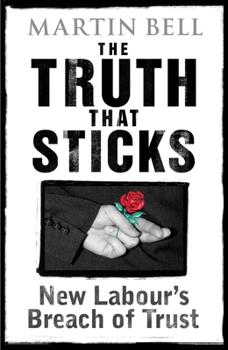The Truth That Sticks: New Labour's Breach of Trust
This is a timely, heartfelt and tough analysis of Britain's New Labour years from a hugely respected journalist and former politician. It is destined to become the definitive critique of the Blair years. Martin Bell dissects scandals from Bernie Ecclestone to David Blunkett; explores Labour's contempt for democracy, electoral reform and cash-for-peerages; attacks the illegal and utterly disastrous decision to go to war in Iraq, and questions the deployment in Afghanistan - he visited both countries in the course of writing the book. He berates the government for its neglect of the victims of its wars, and the faith-based foreign policy behind their deployment. He describes the politicization of the Foreign Office and asks how an ethical foreign policy can be consistent with the continued use of cluster bombs. Behind much of this lies the descent of New Labour's media management skills into the telling of bald untruths in the face of overwhelming evidence. Wide-ranging and pulling no punches, "The Truth that Sticks" is a crushing analysis of Labour's decade of deception, dishonesty and abuse of power, delivered with precision and great passion. "The Truth that Sticks" is a book that only Martin Bell could have written.
Format:Hardcover
Language:English
ISBN:184046822X
ISBN13:9781840468229
Release Date:September 2007
Publisher:Icon Books
Length:304 Pages
Customer Reviews
1 rating
Scorching attack on Labour's lies and sleaze
Published by Thriftbooks.com User , 16 years ago
Martin Bell, the BBC reporter and Independent MP from 1997 to 2001, has written a scorching book on the Labour Party's record in government. Its 1997 election manifesto promised, "We will clean up politics. ... Our mission in politics is to rebuild this bond of trust between government and the people." But, as Bell writes, "on the issue on which it was elected, public trust in public life, its record was wholly, completely and unforgivably negative." Bell calls the House of Commons the `House of Ill Repute', describing the cash-for-peerages scandal, and the insult of state funding for parties. A government inquiry proposed an extra £23 million a year, on top of the current £5.6 million. He notes that the Prime Minister appoints members of the national assembly, and then preaches democracy abroad. He points out that the transitions between Thatcher and Major, and then between Blair and Brown, were not democratic. Bell concludes that Parliament is a rubber stamp for an all-powerful executive, and that the only worse system is the party list system used for elections to the European Parliament. Bell calls the illegal invasion of Iraq `the worst miscalculation by any British government in memory'. General Sir Michael Rose said, "Blair should be impeached." The war gave rise to the unprecedented Military Families Against the War. General Sir Richard Dannatt, Chief of the General Staff, said, "We should get ourselves out sometime soon, because our presence exacerbates the security problems." A British officer in Iraq said, "I'll tell you what this feels like. It feels like being a German in the Wehrmacht in France in the Second World War. We too are an occupation force." Bell has three chapters on the Iraq war, and chapters also on Labour's other unwinnable war in Afghanistan, on the EU's disgraceful role in the break-up of Yugoslavia, on the Labour government's long campaign to keep cluster bombs, and on its mean-spirited treatment of wounded and shell-shocked veterans. Even now, it is still defending the indefensible, the five-year war on Iraq. He notes that in May last year, Labour lost the Scottish election, which was a vote for honest politics, not a vote for the break-up of Britain. Two-thirds voted for the parties that oppose a break-up. Bell's book focuses on what he calls the driving issues of public trust in public life - the Iraq war and the sale of peerages. (I would add the broken promises of a referendum on the EU Constitution.)





